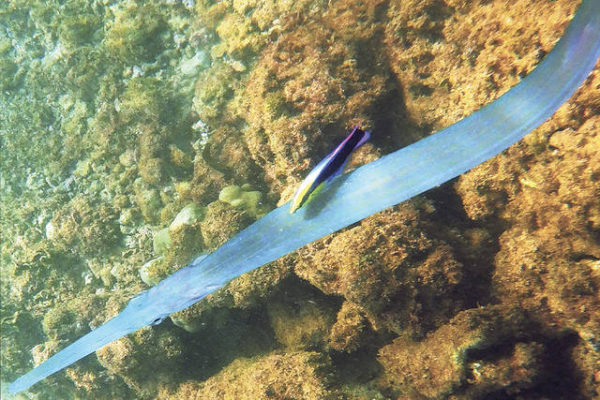Published in the Ocean Watch column, Honolulu Star-Advertiser © Susan Scott
October 13, 2018
Like everyone, I occasionally get overwhelmed with too much to do, and I just want to lie on the couch, eat chocolate and watch “M*A*S*H” reruns. That happened last week, but because 8 a.m. was too early for TV and truffles, I forced myself to go snorkeling. Yes, even I have to sometimes give myself a pep talk to get in the water. And, as usual, I felt far better for it.
Two fish species made my day, first separately and then together.
I often see a cornetfish or two in my area, but this time I counted 15 cornetfish hanging nearly motionless in midwater, all pointed in the same direction as if gazing at an art exhibit. This was an impressive collection because at least half the group was full sized, about 4 feet long, the other half nearly that long.
 A bluespotted cornetfish gets worked
A bluespotted cornetfish gets worked
over by a Hawaiian cleaner wrasse.
©2018 Susan Scott
You might think that 15 carnivorous fish that big would give a snorkeler pause, but not the goofy-looking cornetfish. Hawaii’s common species, called the bluespotted or smooth cornetfish, looks like a stick with eyes, and is harmless to humans.
But small fish, squid and shrimp beware. The front quarter or so of the cornetfish is a tubular snout tipped with an expandable mouth.
When stalking something to eat, the cornetfish moves into position by slowly flexing its long body, hoping that its prey will think the cornetfish is a drifting branch. When the cornetfish halts, it cocks itself in a spring-loaded S shape, ready to lunge. With lightning speed, the stick strikes, sucking in the unsuspecting prey like a lethal turkey baster.
Cornetfish, named after the brass wind instrument (the fish honks like a goose if startled while resting), have no scales. Rather, they host mucus-producing bacteria on their skin. The slimy stuff reduces friction between water and fish, helping them glide with less effort. From this comes the common name, smooth cornetfish.
The bluespotted name comes from pretty spots, lines and bars that cover the cornetfish’s back. These come and go as the fish changes colors and patterns to camouflage itself against the ocean floor.
As I was admiring this unusual gathering of lovely, fearless fish, one veered off to visit a cleaner wrasse station.
Hawaii’s 4-inch-long cleaner wrasses establish territories, darting around in their gaudy purple and yellow outfits to advertise their pest removal and massage services.
The cornetfish cocked open its gill covers, one at a time, to let the cleaner wrasse pick parasites from it gills. That done, the cleaner wrasse slurped mucus from the motionless cornetfish’s skin.
Seeing a gathering of adult cornetfish and watching the little wrasse perform its spa treatment snapped me out of my doldrums. I got a lot done that day in preparing for my upcoming Australia trip, when Craig and I will sail Honu around the Great Barrier Reef.
That evening, I retrieved a gift of chocolate mac nuts from the freezer, put my feet up and watched six episodes of “M*A*S*H.”